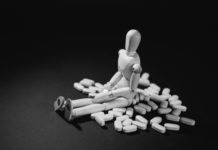Always a Mystery: Why do Drugs Come and Go?
I’ve been teaching a course on substance abuse for about 30 years now. In this course, I cover a new drug class each week and always review the history of the drug. All of the drugs of abuse, cocaine, alcohol, marijuana, opiates are not new on the human scene. They date back to the Sumerians and the Greeks. The question for me is what accounts for epidemics? I have come to believe that epidemics are supplier driven rather than a function of consumer demand. For the current opiate epidemic, the suppliers were the pharmaceutical houses.
Neuroleptic Drugs And Mortality
In November of last year, Schizophrenia Bulletin published a research study that, on the face of it, would seem to upset the notion that neuroleptic drugs are toxic and that their use markedly reduces life expectancy. There are, however, some problems with the study that need to be considered.
The Spurious Chemical Imbalance Theory is Still Alive and Well
The promotion of the chemical imbalance theory did occur, and continues to occur, and is a most shameful chapter in psychiatry's history. It is arguably one of the most destructive, far-reaching, and profitable hoaxes in history. I could not begin to estimate the number of clients I've talked to over the years who told me that their psychiatrists had told them they had a chemical imbalance in their brains, and that they needed to take the pills for life to correct this imbalance. Even today, I regularly receive emails from readers contesting the assertions in my posts and telling me in no uncertain terms that they have chemical imbalances in their brains that cause their problems.
Me, Allen Frances, and Climbing Out of a Pigeonhole
Four weeks ago, after I wrote a blog about a study that concluded there was no good evidence that antipsychotics improved long-term outcomes for people diagnosed with schizophrenia, I was cc’d on an email that had been sent to a number of “thought leaders” about what I had written. At least as I read the email, it put me into the usual pigeonhole for critics of psychiatric drugs: I apparently was globally “against” medications, and I had displayed a type of simplistic “categorical” thinking. All of this led to my having an email exchange with Allen Frances, and his laying out, in his opinion, the considerable "collateral damage" my writings had done.
Call To Action: Massachusetts Bill H4062 for Informed Benzodiazepine Use is Official
On February 24th, 2016 Bill HD4554 - An Act relative to benzodiazepines and non-benzodiazepine hypnotics was filed by Representative Paul McMurtry in the Massachusetts State House. The bill received 47 co-sponsors during the seven-day open period in which legislators can co-sponsor. This is an impressive and promising turnout.
Update: Massachusetts Benzodiazepine Bill Hearing
The hearing for Bill H4062: Informed Consent for Benzodiazepines and Non-benzodiazepine Hypnotics took place on Monday – in the middle of an April snowstorm! The discussion clarified some important points in the legislation and gave survivors an opportunity to tell their stories. I was so proud to be there and witness the courage, camaraderie, resilience, advocacy, and vulnerability of fellow survivors. This legislation is our chance to be heard. As one survivor said, through tears, to the committee, “Do not let my suffering be in vain. I beg you to pass this bill.”
Disability and Mood Disorders in the Age of Prozac
When I was researching Anatomy of an Epidemic and sought to track the number of people receiving a disability payment between 1987 and 2007 due to “mental illness,” I was frustrated by the lack of diagnostic clarity in the data. The Social Security Administration would list, in its annual reports on the Supplemental Security Income and Social Security Disability Insurance (SSDI) programs, the number of people receiving payment for “mental disorders,” which in turn was broken down into just two subcategories: “retardation,” and “other mental disorders.” Unfortunately, the “other mental disorders,” which was the category for those with psychiatric disorders, was not broken down into its diagnostic parts.
Psychiatry’s Thalidomide Moment
The authors of Study 329 began recruiting adolescents for a comparative study of Paxil, imipramine and placebo in 1994 and finished their investigations in 1997. They dropped a large number of their original cohort, so the randomness element in the study must be open to question. Late in 1998, SmithKline Beecham, the marketers of Paxil, acknowledged in an internal document that the study had shown that Paxil didn’t work for adolescents in terms of the two primary and six secondary outcomes they had established at the start of the study. In a nutshell, Study 329 was negative for efficacy and positive for harm, contrary to their succinct upbeat conclusion.
“The Human Cost of a Misleading Drug-Safety Study”
Writing for the Atlantic, David Dobbs examines how much harm has been done in the 14 years since Paxil was wrongly determined to be safe and effective. “Study 329, as it became known, helped spur a huge increase in Paxil prescriptions,” Dobbs writes. “In 2002 alone, over 2 million prescriptions were written for children and teens, and many more for adults.” “Thousands of children, teens, and young adults attempted or committed suicide while on Paxil,” and the reanalysis of Study 329 in BMJ makes it seem “more likely than ever” that many did because of the drug.
Summary of Recent Antidepressant Meta-Analyses
On his own website, clinical psychologist Kenneth Pope has summarized 60 meta-analyses of antidepressants published between 2013-2015. The studies contain information on antidepressants “uses,...
Benzodiazepines: Miracle Drugs?
The first benzodiazepine – chlordiazepoxide – became available, from Hoffman-La Roche, in 1960. Benzodiazepines largely replaced the earlier barbiturates, which had received a great deal of negative publicity because of their much-publicized role in lethal overdoses, both accidental and intentional. Initially, there was a good measure of skepticism among the general public with regards to benzos, and indeed, with regards to psychotropic drugs generally. The dominant philosophy in those days was that transient, drug-induced states of consciousness were not only ineffective in addressing human problems, but were also dangerous. But pharma-psychiatry systematically, deliberately, and self-servingly undermined this skepticism.
Chemicals Have Consequences: Antidepressants, Pregnancy, and the New York Times
Depressed pregnant women need good care. They should not be made to feel guilty for the choices they make concerning their depression or lectured to by those who don’t understand the area or lack compassion for them. In that sense, Andrew Solomon does the public a service by turning his attention and writing talents to the topic of depression and pregnancy this week in the New York Times. However, a crucial part of providing good care to depressed pregnant women is to give them accurate information on the topic. In this sense, Andrew Solomon falls short.
A Tale of Two Studies
With increasing evidence that psychiatric drugs do more harm than good over the long term, the field of psychiatry often seems focused on sifting through the mounds of research data it has collected, eager to at last sit up and cry, here’s a shiny speck of gold! Our drugs do work! One recently published study on withdrawal of antipsychotics tells of long-term benefits. A second tells of long-term harm. Which one is convincing?
The Case Against Antipsychotics
This review of the scientific literature, stretching across six decades, makes the case that antipsychotics, over the long-term, do more harm than good. The drugs lower recovery rates and worsen functional outcomes over longer periods of time.
Dr. Pies and Dr. Frances Make a Compelling Case that Their Profession is Doing...
Over the past two months, Ronald Pies and Allen Frances, in response to a post I had written, wrote several blogs that were meant to serve as an “evidence-based” defense of the long-term use of antipsychotics. As I read their pieces, I initially focused on that core argument they were presenting, but second time through, the aha moment arrived for me. Their blogs, when carefully parsed, make a compelling case that their profession, in their use of antipsychotics as a treatment for multiple psychotic disorders, has done great harm, and continues to do so today.
The Reckoning in Psychiatry Over Protracted Antidepressant Withdrawal
Medically-induced harm—affecting tens of millions of people worldwide—has taken the field decades to take seriously.
Lithium and Suicide: What Does the Evidence Show?
There appears to be increasing acceptance of the idea that lithium prevents suicide, and even that it can reduce mortality rates. For a toxic drug that makes most people feel rather depressed, this seems curious. I did wonder whether it might be having this effect on suicide by sapping people of the will to act, but the proposed effect on mortality seems completely inexplicable. A closer look at the evidence, however, suggests the idea is simply not justified.












